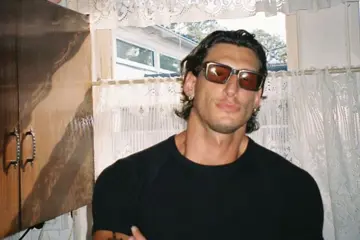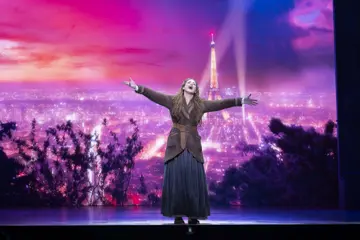Folamour is one of the most interesting international underground DJs. On one hand, you have his epic live sets. Combining areas of hip hop, house music, disco and classic pop hits, he delivers a poignantly positive energy and aura, with a very clear deliberate ethos of making people smile. On the other hand, Folamour is a singer, songwriter and producer. He recently released his third incredible body of work, 'The Journey' cementing his sonic class beyond that of just a touring DJ.
Since the beginning of the year Folamour drip fed audiences singles from the record. Each and everyone came with more and more praise, and the album lived up to its hype. 'The Journey' is a 12 track package of incredibly vibrant and complex production mastery. He moves away from his sample and loop driven focus of his previous work, tapping heavily into his vocals, lyrics and recordings of native instruments. Showcasing this most is the personal tale that is 'Resonate'. The track positions the rest of the record as one with full of substance, brimming with joys and trials through its direct lyrical messaging and sonic queues.
Folamour made the record on the side of touring in 2019, and perfected it during 2020s lockdown. During the 2019 period, he performed over 140 shows. His last visiting location before COVID-19 swept the globe was Australia, headlining Pitch Festival and hitting local clubs across the country. It was during this touring period Folamour solidified himself as one of the best selectors in the globe. No moment is more evidence of this than his iconic, 2019 Boiler Room set, which saw the world go crazy with his spin of ABBA's classic 'Gimme Gimme Gimme'.
We were lucky enough to hop on Zoom with Folamour, reflecting on his most viral moments, creating a heartfelt and personal record, his mental health and the effect of touring and writing with some of the best songwriters in the globe.
Don't miss a beat with our FREE daily newsletter
First time I caught you live was at this courtyard party in Sydney. Was such a vibe, I’m so glad I saw you their first at an open air venue, before the club experience.
I always provide something closest to what I want to give as a DJ when I’m outside. Outdoors, during the day, it's always a moment where I feel in the best conditions to do what I want to do.
You’re probably sick of talking about it, but I feel like the ABBA moment is a good place to start. Obviously that changed alot for the trajectory of Folamour, and it’s so rare for an underground dance DJ to go completely viral. Did it affect how you went about things creatively at all, or do you see it more as just a nice platform to build off?
I think it gave me a great sense of freedom. After that moment I had a lot of expectations from my audiences to play that track. That expectation made me feel even freer to play whatever I want, and free myself from that, and do the exact opposite what people expect from me. It’s something I’ve never thought about before, I never thought about my own freedom as an artist, because I always just did whatever I wanted to do. After that moment, because everyone was expecting that from me again, in a really hardcore way, it gave me a sense of freedom, being able to do the opposite of the expectations, and still do my job in the best way I can.
The great thing about the ABBA moment was that nobody was expecting it, and that’s why it was so special. So immediately it’s not as special again if people are waiting for it at a show.
I think what I try to do when I was playing that track is very close to what I try to do generally as an artist, which is to show that great music doesn't have any frontier, and there are no limits or between commercial music and great music. It can be commercial and good, commercial and bad, underground and good, underground and bad. I just want people to focus on the music and forget about everything else. ABBA is amazing, so I’m proud of that moment. It brought back that the music was important, more than what the band is, where it comes from, is it big or small.
One thing I love the most about your meteoric rise is that you get sooo much credit for being excellent at digging records. I feel like your sets do so well online because the ID requests are crazy, while balancing them with some pop hits. How much inspiration does finding new music give you in creating music, or do you think that making and finding music are two separate tasks for you?
I see them as two separate tasks. First I don’t do them at the same time. In my mind I switch between both brains. They don’t relate because I don't try to produce music that I’m going to play. They’re really different in my mind. I’m trying to have these two different careers at the same time, and I plan on keeping it that way. I love that I can be joyful and happy when I’m a DJ and thats what I want to do when im DJing, just make people happy. But when I’m making music, I want more shades of feelings, sadness, nostalgia, that doesn’t necessarily fit in the type of live environment I perform in. I’m seeing that I almost have two different crowds, one crowd that focuses on my DJ sets, and one crowd that wants to listen to my music at home. Despite that, it’s still a lot of people in common.
You started ‘The Journey’ before COVID, and then finished it during lockdowns. What did the time away from the club teach you or change about your approach to making music? Do you feel like often club music, and constantly being in clubs and touring limits your creative freedom for the songwriting side of Folamour?
Firstly it gave me a lot of time ahead to try things out and make music. The four songs that I brought to the album that I made before the lockdown were songs where I’m singing. It’s something I’ve always dreamed of doing but it takes a lot of time to try and try again. Especially when it's the first time I'm singing on records. It took a long time for me to find my own voice and find my own way to tell stories. I’m grateful for that extra time. At the same time it can be the same for all electronic music. When an artist is on tour permanently and they’re always in clubs, it limits your brain to thinking this is the only world out there and this is the only music you can do. For me the greatest electronic music made in the last 15 years are always from people that are stepping back from clubs. People like Bonobo, Fourtet, Floating Points, you can feel that they stepped back, and thought about just making great electronic music that isn’t forcing people to dance. I think lockdown generally might be good for the sound of electronic music, I think lots of artists are going to realise their freedom when creating music.
Onto the touring schedule. How do you honestly survive? How do you deal with the dichotomy of the massive attention being on stage and in these high pressure environments with being alone and feeling far away from home?
I think the album carried me through all this. Always working on something on the side and giving 100% to something and always working on it. It keeps me motivated to work to get me through to the end of creating something. I imagine that this is what carried me through it all. Lot’s of it though has to do with surviving day to day. When I was touring constantly it was one day at a time, and keep working. It was a crazy period, but it made me aware of what I don’t want to do in the future. The long break made me step back and reflect on, “is 2019 the basis of what you want for your life?” and it wasn’t. Now I know I need to find my own balance between work and my health. It can be really hard when you start out because you want to see your fans everywhere and give back to them.
The most recent single, ‘Lost in Space’ features SG Lewis. What was that creative process like, and what did working with someone with that level of songwriting stature/ outside of that european club world teach you about making music?
I think he taught me about how easy things can be when you’re acting natural. Whenever I collaborate with someone I always try to be as natural as possible, whether a back to back on stage, or creating a song together. We actually had never met physically before, we were just chatting back and forth on Instagram. The moment we wrote, ‘Lost In Space’ was the first time we met in real life, so it was weird but he is such a nice and humble guy and so am I, it was so simple and natural. It took one day to write the song, and we both felt it was super personal. It was so natural. It does not need to be a big moment, if you’re nice to people and it runs smoothly, that’s the recipe. I really appreciated working with him, his a great top liner and has so many good ideas for great melodies.
What song are you most excited about people hearing on the record and why?
Thats a tough question. There are so many songs that I want people to listen. If i had to pick one it would be ‘Resonate’. It’s a song I’m singing on. It’s the last song I brought into the album. I was just making music last Summer and it came in a flash. It’s a song that’s really personal to me in sentiment, and I’m super excited to see how people react to it. It’s the most exciting, but also the most stressful.
Words by PARRY TRITSINIOTIS
SEE ALSO
FOLAMOUR TAPS SG LEWIS FOR NEW SINGLE ‘LOST IN SPACE’
THE UNITY OF DISCO AND HOUSE IN FOLAMOUR’S NEW EP
















